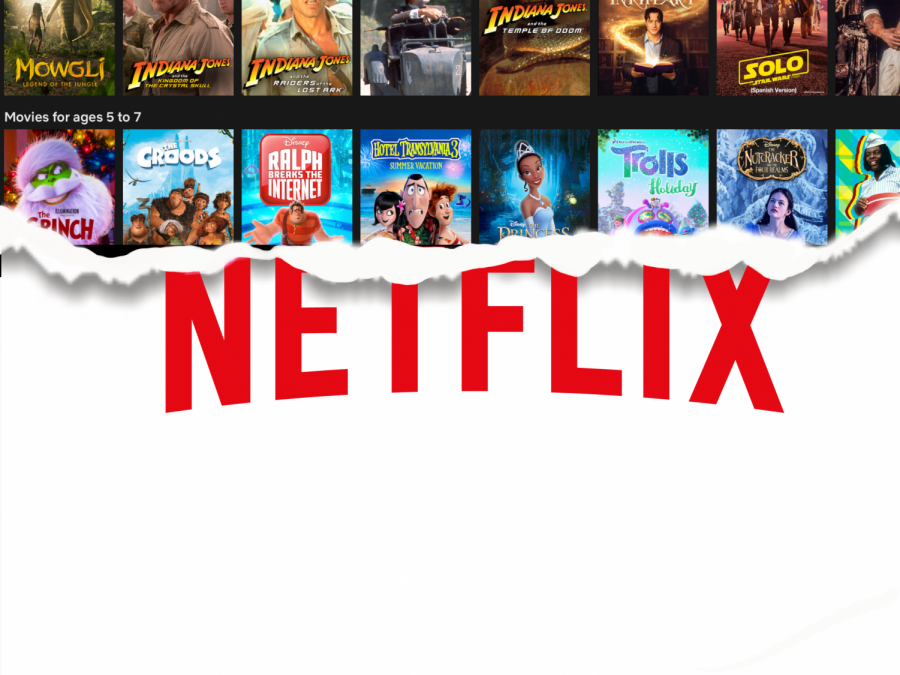The Role Content Plays in Today’s Video Streaming Industry
Netflix’s future as the leading streaming platform is predicted to suffer, due to content.
December 16, 2019
The role content plays in today’s industry of video streaming
Netflix has been the most popular video streaming service for the past decade. A variety of titles in their video library quickly became their key marketing feature. Nonetheless, during its transition from DVDs to streaming, they had little other competition. As a result, Netflix was making bank.
However, nothing lasts forever. In a new age with countless options in streaming media, companies within the industry have struggled, not only to appeal to a mass audience, but to keep them from switching platforms. With similar price points among competitors, the success of a streaming platform has far more to do with content than anything else.
In Netflix’s case, their content includes originals, however, their main source comes from titles bought from separate companies under licensing agreements, for example, Disney.
Some may be surprised to learn that Disney’s library extends much deeper than princess classics, as the company continues to produce one of the most impressive collections of titles ever seen.
However, this era of entertainment has caused competitors to exit from Netflix once their leases for content have expired in an effort to take advantage of the cash-flowing industry. Each is working to create its own platform to compete with one another, as well as Netflix. This would include Xfinity (a Comcast business), Disney, and Warner Bros. – currently Netflix’s largest video suppliers.
As a result, media experts predict that Netflix’s future as the primary video streaming platform is in jeopardy.
“We’re going from a world where Netflix enjoyed zero competition, to a world where the biggest, most powerful media companies on earth will directly compete with it,” said Stephen McBride recently for Forbes.
Netflix didn’t originate by selling millions of subscriptions based on its original content. Instead, their business served as a home for cross-company content where users receive titles from multiple services. In doing so, Netflix became the hub for video streaming – until now, of course.
A poll from the Hollywood Reporter expressed that 22% of Americans in a THR/Morning Consult survey would cancel their subscription if Marvel films were withdrawn from Netflix.
Nonetheless, viewer favorites such as Disney’s Star Wars, Marvel, and popular sitcoms like Friends and The Office are set to leave. Netflix knows that its customers are likely to go with their favorite content.
Disney’s new streaming platform caused quite a bit of digital hype. Consumers were interested in the offers Disney will provide that once resided on Netflix. Everything depends on the content.
Content drives the market. Take YouTube for example. Youtube is similar in design, though its product ranges from a free service to a paid platform. Without millions of videos and a constant stream of production – nearly 300 hours of content added every minute, is YouTube really what we call “YouTube?” If we weren’t finding at least a portion of the countless number of videos on the page “entertaining,” we wouldn’t watch it. This would result in fewer views, leading to barely any opportunity for sponsorships and advertisers, meaning less profit.
If Netflix were deprived of the titles the public expected in its $12.99 (or higher) price each month, it would fail as a business.
Some may argue that Netflix’s originals would make up for the removal of the shows and movies, however, that would defeat the initial purpose of Netflix’s company: to serve as a bridge between the different video producers. With only Netflix productions, users may end their subscriptions. We might as well just buy subscriptions to all the platforms…right?
Meanwhile, the highly anticipated day finally arrived on November 12th when Mickey Mouse’s secret weapon was unveiled: Disney Plus.
Disney Plus includes hundreds of titles at a fairly low introductory price when compared to its competitors, ($6.99 per month, vs. Netflix’s $12.99 standard rate). However, Netflix hundreds of more titles than Disney Plus’s current collection.
The interface includes 4 different categories of content – each nostalgic and action-packed in its own way: Disney, Pixar, Marvel, and Star Wars. A fifth, often forgotten category hides to the side: National Geographic.
But what’s left for Netflix? In the previous month, we’ve seen it all: the memes, TikToks, debates, etc. Are they struggling as expected? Will Disney deliver the knock-out blow?
Netflix’s stocks have dropped a significant 30% in the last twelve months, and investors have been advised to “stay away” from the company. Yet there may be more to the story than what meets the eye.
Even before Disney+ was even announced, user complaints on social about trying to find something on Netflix that haven’t already watched weren’t difficult to find. The couch potato struggle was real.
“I used to scroll endlessly through the shows and movies that either seemed boring or those that I’ve already seen,” Makayla V., a student at Day Creek Intermediate says. “Eventually, I would just stop trying and switch to another app.”
While concerns toward Netflix’s issue with content has been going on for a while, it isn’t the only company facing criticism.
“It wasn’t just Netflix — I had to go through the same process with Hulu as well,” said Makayla V.
Content is make or break for a company. It seems to be something that nearly all companies in the industry either struggle with or have been forced to find a solution to.
So where does that leave Disney Plus?
With the changes coming to Netflix, one of the main reasons customers are attracted to Disney Plus is because of its potential in acting as a replacement for what is missing from other streaming platforms.
While Netflix’s concept has reinvented itself over time, it recognizes the challenges ahead. Without constant, entertaining content production, a company in this field is set up to eventually lose its customers. At some point, Disney Plus may face a similar competitor if it doesn’t also maintain a strong content strategy.
In today’s media-reliant age, companies like Netflix, Hulu, and Disney+ aren’t going to last forever – and content is likely to be the reason for it.






